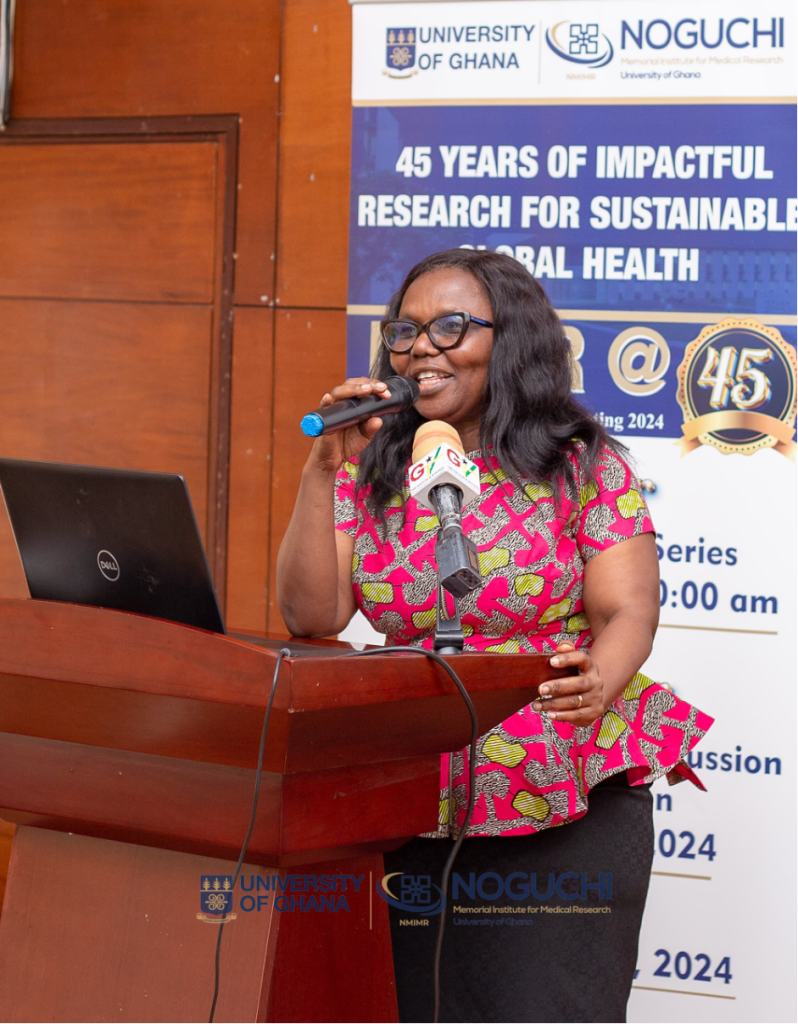Prof. George Boateng Kyei, an Associate Professor of Virology at the Department of Virology, NMIMR, and the Director of Research at the University of Ghana Medical Centre (UGMC), has highlighted the significant contributions of Noguchi Memorial Institute for Medical Research to HIV research since its inception in 1979.
During a lecture on “HIV Research and Future Directions in Ghana” as part of the ‘October Lecture Series’ marking the 45th Anniversary and the Annual Research Meeting of Noguchi Memorial Institute for Medical Research, Prof. Kyei underscored the invaluable contributions NMIMR has made to HIV research dating back to the first detected cases in Ghana in 1986.
He emphasized Noguchi’s contributions to understanding the virus, particularly in characterizing HIV-1 and HIV-2 subtypes, as well as conducting resistance testing for the National AIDS Control Programme. “Without Noguchi’s research, the response in Ghana would have been far worse,” he noted, stressing the importance of continued research into HIV and other co-infections such as HTLV, HBV, and syphilis.
He shared alarming statistics about the epidemic’s global impact, emphasizing that nearly 50 million people have died from AIDS-related complications roughly equivalent to the combined populations of Ghana, Togo, and Benin.
According to him, 39 to 40 million people are living with HIV worldwide, with 1.3 million new infections recorded in 2023 alone. “This remains a problem for us,” he reiterated, stressing the need for Africa to lead efforts in addressing the epidemic, as the continent accounts for over 70% of HIV cases globally.

Prof. Kyei indicated that HIV is likely the only disease that has received intensive research and investment. He added that advancements in HIV treatment have resulted in over fifty (50) approved medications, of which about twenty (20) are fixed-dose medication combinations that allow patients to take one pill per day.
He further pointed out that while these medications are not curative, they are highly effective at controlling the virus. “These medications reduce the viral load to undetectable levels, meaning the virus cannot be transmitted, even through unprotected sex,” he said. He highlighted that this makes achieving undetectable viral loads a crucial goal in halting HIV transmission, saying, “Undetectable equals untransmissible.”
However, despite the availability of effective treatments, access remains a challenge in Ghana. Prof. Kyei compared Ghana’s situation to that of Botswana, noting that while 97% of people living with HIV in Botswana know their status, only 65% in Ghana are aware. This shortfall hinders the country’s progress toward achieving the World Health Organization (WHO) or UNAIDS 95-95-95 targets. “In Ghana, we have the tools and the medications, but sometimes issues with access keep us behind,” he stressed.

In her opening remarks, Prof. Dorothy Yeboah-Manu, Director of NMIMR, acknowledged the Institute’s critical role in combating HIV since the virus emerged in the 1980s. She reflected on the Institute’s historical contributions, saying, “This very Institute was responsible for culturing the first virus sample in the country and has been at the forefront of HIV research ever since.”
Prof. Kyei concluded by outlining future research directions in Ghana, calling for greater investment in expanding access to HIV treatment and improving health systems to ensure that everyone living with HIV can achieve undetectable viral loads, which would ultimately lead to the end of the epidemic.


